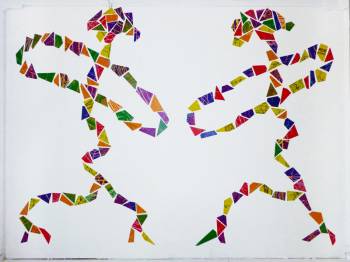Many studies in recent years tend to make us understand that we have a biologically based ethics and that ethics is based on a group situation, and most importantly embodied in our body and its movements. We are not an “I” but rather a “we” and since our birth. This is why empathy becomes a very important dimension for ethics.

Andrius V.Plioplys, “Mirror Neurons”, November 2012, Chicago.
The discovery of mirror neurons by a group of scientists led by Giacomo Rizzolatti was judged by the eminent neuroscientist Vilayanur S. Ramachandran harbinger of changes for psychology equal to those that caused by the discovery of DNA in biology: our ability to reproduce the actions of others and to understand their reactions depends on specific brain processes that involve mirror neurons that are activated instantly and unconsciously (therefore not by cognitive or volitional processes) to “reflect” namely reproduce, without bringing it to the execution, the action, the emotions and the feeling of others. What binds us to other human beings – and especially what make us to “understand” them – is therefore, primarily, a biological condition that does not depend at all on the awareness, by the decision, by the cognitive representation: it is about empathy, a provided pre-cognitive and pre-verbal condition. After all, Aristotle already said it: man is a zoon politikon, a social animal and the most relevant consequence of this new vision of empathy is that we are biologically social because we have incorporated in us in a genetic and determinate way an apparatus that allow us to perceive, recognize and reproduce what other people make or feel.
On the other hand Paul Ekman, consultant of the famous TV series Lie to me, had shown that human beings express and recognize emotions independently to their own culture. How? With empathy.
In short, we are not “I” (ego) but “us”, and it is curious that the Western world has developed over the last two or three centuries a culture so wildly individualistic and how even today many people think very naively that “society is made of individuals”, that “at the end who decides is the person” and that “we are all selfish” and “basically everybody think only to their own advantage”. Scientifically speaking is all nonsense. Truly enough we are individuals, but also surrounded by networks of reciprocal imitations, as Freud argued, and a person (remember that the word means mask) is the result of continuous interaction and imitations that connect it to many other people that in their times reflect it and are reflected: the brain is not individual, the brain is a social network.
What’s more, the discovery of the functions of the mirror neurons, along with other research, as for example the Lakoff’s metaphor, leads us to think that not only learning and knowledge occurs in a social context, that not only we are biologically us, but also, that we know, learn, communicate also and above all through the body and the movement. We are body animals, as well as social, and the fundamental role in the understanding of others, or empathy, is being done by the motor system, being responsible for muscle control and regulation of movements, for example, allows us to feel sadness when we see a sad face – this is why emotions are contagious and cartoons, with their stylized and exaggerated expressions, are understood all around the world.
Empathy is not to be good or sympathetic or understanding. It consists of an innate ability and linked to the motor system, or to act, that enables us to understand at a glance others and their actions, and consequently their and our interactions, allowing us to share the sense of all that we do, as much as to the reasons as much as to the purpose. In short, without empathy stops everything (think that much research maintain that the deficiency of the mirror neurons is correlated to autism), at least all that binds to the interactions of human beings, to their being together in society to do things. That’s why empathy is important: with more empathy we do better and more.
C-oauthor IES – Intelligenza empatico sociale , Franco Angeli.




